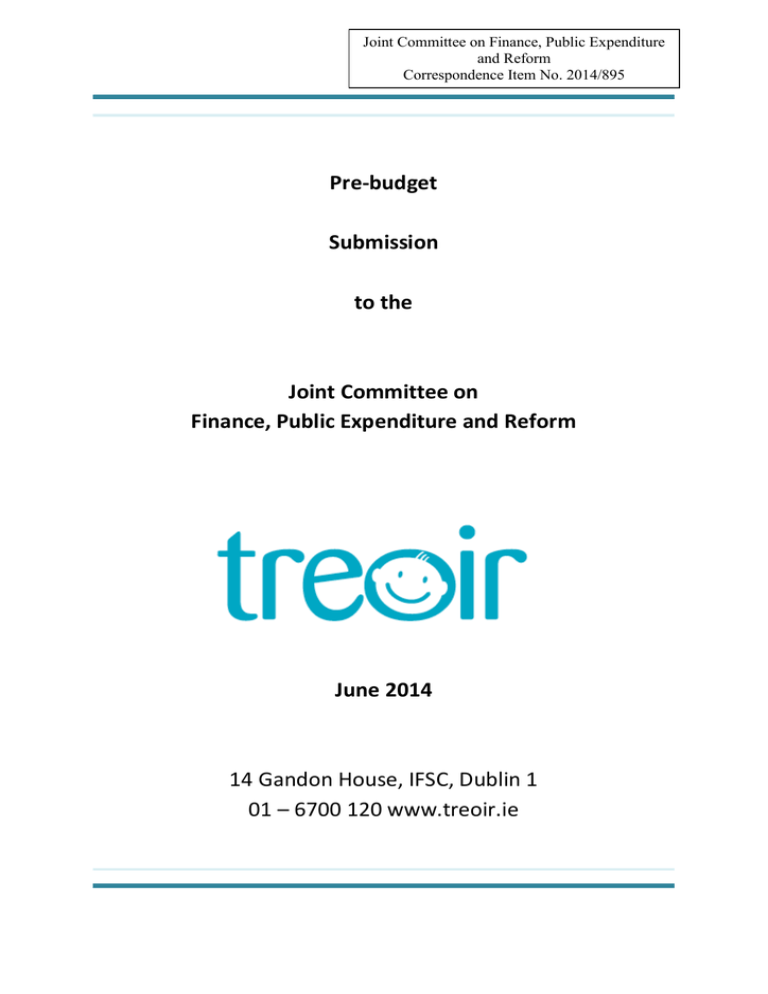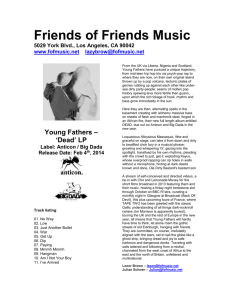Treoir
advertisement

Joint Committee on Finance, Public Expenditure and Reform Correspondence Item No. 2014/895 Pre-budget Submission to the Joint Committee on Finance, Public Expenditure and Reform June 2014 14 Gandon House, IFSC, Dublin 1 01 – 6700 120 www.treoir.ie Founded in 1976, Treoir is the national federation of agencies which provide services to unmarried parents and their children. Membership of Treoir is open to professional agencies providing services to unmarried parents. They are a combination of statutory and non-statutory bodies, including specialist agencies, the HSE, maternity hospitals, adoption agencies and self-help groups. Treoir, in partnership with its member agencies, promotes the rights and best interests of unmarried parents and their children through providing specialist information and advocating for their rights. Treoir works to achieve this aim by providing a National Information Service to unmarried parents, their extended families and those working with them through answering queries, information website, publications, outreach workshops etc. promoting change at every level to achieve constitutional and legal equality for unmarried parents, and to improve services and attitudes to unmarried parents promoting/undertaking research to better understand the situation of unmarried parents and their children in Ireland Collaborating with other agencies to promote our aim through the federation of Treoir and agencies outside Treoir Co-ordinating the Teen Parents Support programme Principles Treoir: recognises the diversity of family life recognises that all families, including unmarried families, have the same rights to respect, care, support, protection and recognition supports and promotes the rights of all children as outlined in the United Nations Convention on the Rights of the Child believes that all children have a right to know, be loved and cared for by both parents. 1 Submission to Joint Committee on Finance, Public Expenditure and Reform 2014 1. INTRODUCTION Since the early 1970s the One-Parent Family Tax Credit (OPFTC) was available to both parents, where they were not living together (or married or cohabiting with another partner) but had care of the child for at least one night in the tax year. In addition to the tax credit of €1,650 there was an expanded Standard Rate Tax Band of €4,000 worth nearly €900 in a year. Where both parents were committed to their children this was a very welcome tax credit, which helped alleviate the financial cost of having a child in a parent’s care. It is considerably more expensive to run two homes where unmarried parents are not living together – both homes, as well as needing accommodation for the children, also pay for two sets of fuel costs, two sets of rising utility costs and two sets of food costs. Treoir recognises that there were issues with the OPFTC (particularly around the qualifying condition of one night in a year) and would have supported change in the conditions of entitlement to the tax credit. Without any prior warning, in Budget 2014, the Minister for Finance announced that the OPFTC would be abolished and replaced with the Single Person Child Carer Tax Credit (SPCCTC) with one crucial difference – it would be available only to one parent - the “primary” carer – the carer in receipt of Child Benefit. 2. HISTORY The original objective of the OPFTC was to encourage lone parents (the resident parent – usually the mother) into employment. Over the years it became available to non-resident parents (usually fathers). It generally became viewed then as a support to parents who were living apart to assist with the additional costs of running two homes while caring for their children rather than an incentive to take up employment. The Commission on Taxation issued its Report1 in 2009 stating: “We acknowledge that this (One Parent Family Tax Credit) tax relief plays a role in supporting and incentivising the labour market participation of single and widowed parents. We therefore recommend that the tax credit should continue. However, we also note that the annual cost of this relief is considerable. We recommend that Government should seek to minimise or eliminate the inefficiency (or deadweight element) associated with this relief in relation to the allocation of the full credit (and the additional standard band which applies as a result) to both parents. Such a move would help restore greater balance between the cost of the tax credit and the benefit derived from it. Accordingly, we recommend that the credit be allocated to the principal carer only in accordance with the current arrangements for child benefit." However, taxation needs to encompass social justice and equality considerations, as well as 1 Commission on Taxation Report 2009, Stationery Office, Dublin 2009 2 Submission to Joint Committee on Finance, Public Expenditure and Reform 2014 economic policy and fiscal imperatives. The Commission on Taxation included accountants, economists and financiers but it lacked special expertise in family welfare and the wider social policy agenda. The Commission did not receive submissions or oral presentations from the main independent organisations concerned with family issues and children, nor did it meet with these organisations. How then, could the Commission on Taxation have been aware of the serious impact the abolition of this measure would have on single parents, particularly in its negative impact for single fathers and the children in their care or realise the human cost of their recommendation. It is instructive to observe that the only trade unionist on the Commission – Brendan Hayes the vicePresident of SIPTU – refused to sign the Commission’s report, saying that he believed some recommendations ‘will undermine social cohesion’ and that the Commission has ‘struck the wrong balance between fairness and efficiency in its recommendations.’2 The genesis of the Commission’s recommendation to abolish the One-Parent Family Tax Credit is therefore deeply flawed. 3. AMENDMENT Following serious lobbying by some family organisations (including Treoir) and many individuals, the Minister for Finance conceded that the new SPCCTC could be relinquished by the “primary” carer, if she could not avail of it (for instance if she was a recipient of social welfare and therefore not in the labour market or working and not in the tax net) to the “secondary”3 carer who could avail of it subject to the child being in his care for 100 days4 in the year. This 100 days in the year was arrived at as follows5: Weekends 20 x 2 Summer 6 weeks Easter 2 weeks Christmas 1 week Total = = = = = 40 days 43 days 15 days 8 days 106 days. Fulfilling the 100 day rule could prove extermely difficult, if not impossible, especially for unmarried fathers, in the following situation where – The child is very young – it is unreasonable and shocking to expect the mother of a very young baby to share parenting to this extent with the other parent, especially where the mother is breastfeeding The child is ill, perhaps in hospital for a period, s/he may not be able to travel or stay overnight with her/his father every allocated weekend 2 Op cit 3 Many fathers were extremely upset to be referred to as ‘secondary carers’. 4 Saturday morning to Sunday evening is counted as two days 5 www.revenue.ie 3 Submission to Joint Committee on Finance, Public Expenditure and Reform 2014 The parents live a considerable distance from each other and a weekly arrangement may not be financially possible Children have events on at weekends (sports, parties, music etc.) Older children may not want to go to the other parent on particular weekends The father is working full-time and cannot realistically take the child/ren for 6 weeks in the summer Work hours of either parent may change. It was not clear as to how the 100 day requirement would be monitored. An additional group not covered in this amendment is the group of fathers who are sharing parenting of their children with the mother and where the mother is now married or cohabiting. The mother has no entitlement to the Single Person Child Carer Tax Credit and therefore there is no tax credit which could be relinquished to the father. 4. IMPACT OF CHANGE The following table (confirmed with the Revenue Commissioners) illustrates the effect of the change: Annual wage €13,500 (minimum wage x 30 hours) €20,000 €30,000 €40,000 €60,000 Increase in tax take per week No change €13 €10 €48 €47 Following the coming into effect of the Budget change, Treoir and other support agencies for lone parents were inundated with calls from fathers who were variously angry, furious, surprised, daunted, overwhelmed, frustrated, desperate etc. Many fathers were unaware of the change and were puzzled by the significant reduction in their pay packet. One father wrote6: My first payment for 2014 confirms that the loss of the One-Parent Family Tax Credit (Single Person Child Carer Tax Credit) has increased my tax by €195.94 per month i.e. €2,351 per annum. This is a huge additional imposition. This sudden loss of just under €200 per month will have a negative impact on my children. Their mother cannot at present benefit from the credit but is currently unwilling to relinquish it (even temporarily) in case she might need it. The Credit is therefore currently unusable by either parent in my case. In 2013, the children resided with me for just over 50% of the year. 6 personal email to Treoir. 4 Submission to Joint Committee on Finance, Public Expenditure and Reform 2014 A letter published in the Irish Times in February 2014 stated: As a practising barrister I am already receiving queries in relation to the impact of this, largely unnoticed and unpublicised, change to the tax code. Clients are unable to meet their maintenance payments and this is inevitably going to lead to an increase in cases being entered into the court system to resolve disputes between parents. This in itself causes a financial difficulty in that maintenance orders which have been made in the Circuit Court must be reviewed by the Circuit Court with the obvious considerable cost implications for parties. In addition, I believe that this regressive action will lead to fathers not being able to take up overnight access with their children as they will no longer be able to afford appropriate housing for them and for their children. 5. CURRENT CONTEXT 1. The Programme for Government contains a commitment not to change current income tax credits, rates and bands, nor to increase the marginal rate of tax. Prior to the Budget both Taoiseach Enda Kenny and Minister for Finance Michael Noonan stated that no person’s pay packet would be affected by the budget. This new measure, however, has increased the tax take of a significant number of the 25,573 fathers7 who were availing of the OPFTC in 2013. The removal of any portion of the tax credit and/or extended tax band amounts to an increase in income tax payable therefore breaching directly the Programme for Government. 2. Treoir has long been advocating co-parenting as it is widely recognised that it is best for children to grow up with the involvement of both parents in their lives, as long as this is safe, practical and in the best interest of the child. Fathers should be valued, not turned away. It’s the most important job any man will ever have in his life. There is a need for a whole of government approach to support shared parenting in the best interest of children. 3. Some government departments are promoting the involvement of fathers in the lives of their children and shared parenting, in the best interest of children: 7 The Child and Family Agency in its 50 Key Messages for Parents states that it is important for children to have their fathers involved in their lives. Revenue Commissioners 5 Submission to Joint Committee on Finance, Public Expenditure and Reform 2014 The Department of Social Protection is drafting legislation to ensure that the names of both parents are entered in the Register of Births. The Department of Justice and Law Reform in its General Scheme of a Children and Family Relationships Bill 2014 has introduced the possibility of some unmarried fathers acquiring automatic guardianship rights in respect of their children. It is also proposed that the “best interests of the child” be the “paramount consideration” when considering matters of custody, guardianship and access. The Department of Finance is actively working against this important trend to support fathers to be involved in the lives of their children. It is hard to see where the best interests of children lie in a decision which has, for many fathers, push their already fragile financial positions to a place where they are no longer be able to support them. 4. Many fathers pay maintenance without fail to the mother of their children. In addition, many voluntarily pay for extras including health insurance, books and other school expenses, clothes, Christmas and birthday costs, holidays and extra-curricular activities including camps, sport and music — plus many other incidental costs. As fathers' incomes have dropped significantly because of this budgetary measure, they are unable to maintain their level of support for their children. Wherever fathers are hurt by this measure, their children will be adversely affected too. 5. The measure has also engendered tension between parents who are living separately. We know this from the large number of calls received in the Treoir National Information Service. In some instances the communication between parents is very poor. Trying to negotiate the transfer of the SPCCTC from one parent to the other is not feasible in many instances because of this. 6. The measure will also see many new cases coming before the family courts for adjustments to maintenance orders, where fathers may seek to have maintenance payments reduced to recover the financial consequences of losing the One-Parent Family Tax Credit. 7. The Legal Aid Board may also see an increase in the need for its services, as maintenance agreements need to be re-adjusted. 8. The increase in tax take from single fathers may result in an unexpected rise in Social Protection spending where recipients of One-Parent Family Payment will have their Payment increased due to a lower level of maintenance being received from the other parent. 6 Submission to Joint Committee on Finance, Public Expenditure and Reform 2014 6. WAY FORWARD In response to the issue being raised recently in a Topical Issues Debate by Regina Doherty, T.D. the Minister of State, Brian Hayes stated: The Minister for Finance did give a commitment to the House which I will reiterate today, namely, that the Government will consider the operation of the (SPCCTC) credit this year to ascertain whether it can be improved and establish whether it can be tapered in such a way as to maximise the benefit for those concerned. The matter is under active review, as are all such credits. This was the intention with the original objective, as set out in the Bill. The Minister also committed to, between now and the next Budget, to finding ‘a new way to deal with this issue’ to achieve ‘a more workable solution’ He was also noted as stating: An issue at which we all need to look between now and next year's budget is whether we can find a new way to deal with this issue. I heard colleagues who were engaged in this issue on Committee Stage state that they had not the time to put forward a more workable solution to this issue. The Government is all ears on how we can resolve this issue but it must be done on a fair and equitable basis. We cannot discriminate in favouring of one group as against another. It was generally agreed that the One Parent Family Tax Credit needed to be amended. A complete abolition and replacement with a measure which significantly and negatively affects fathers and their involvement in shared parenting is not the answer. The Minister of State at the Department of Finance is at pains to say that the Single Person Child Carer Tax Credit will be re-examined. This would be an essential first step in addressing this controversial and discriminatory issue. Treoir is calling on the Minister for Finance to fulfil his promise to review the Single Person Child Carer Tax Credit and is willing to offer any support or information to the Minister, his Department or anyone else involved in this review. Treoir June 2014 7 Submission to Joint Committee on Finance, Public Expenditure and Reform 2014 SUMMARY 1. Since the early 1970s the One-Parent Family Tax Credit (OPFTC) was available to both parents, where they were not living together, or not living within a marriage-like relationship, but had care of the child for at least one night in the tax year. 2. In Budget 2014, the Minister for Finance announced that the OPFTC would be abolished and replaced with the Single Person Child Carer Tax Credit (SPCCTC) with the one crucial difference – it would be available to one parent only - the “primary” carer – the carer in receipt of Child Benefit. The measure is designed to save €25m and will impact on a significant number of parents (mainly fathers). 3. This change was recommended by the Commission on Taxation in its Report in 2009. However, the genesis of the Commission’s recommendation to abolish the One-Parent Family Tax Credit is deeply flawed. 4. The Minister for Finance conceded that the new SPCCTC could be relinquished by the “primary” carer, if she (usually the mother) could not avail of it, to the “secondary” carer (usually the father) who could avail of it subject to the child being in his (usually) care for 100 days in the year. Fulfilling the 100 day rule could prove extermely difficult, if not impossible. 5. The removal of any portion of the tax credit and/or extended tax band has, de facto, amounted to an increase in income tax payable therefore breaching directly the Programme for Government. 6. There is a need for a whole of government approach to support shared parenting in the best interest of children. 7. Fathers' incomes have dropped significantly because of this budgetary measure; they are now finding it difficult to keep up the level of expenditure on their children they had previously. 8. The Minister of State at the Department of Finance is at pains to say that this issue will be re-examined. This would be an essential first step in addressing this controversial and discriminatory issue. 8 Submission to Joint Committee on Finance, Public Expenditure and Reform 2014








